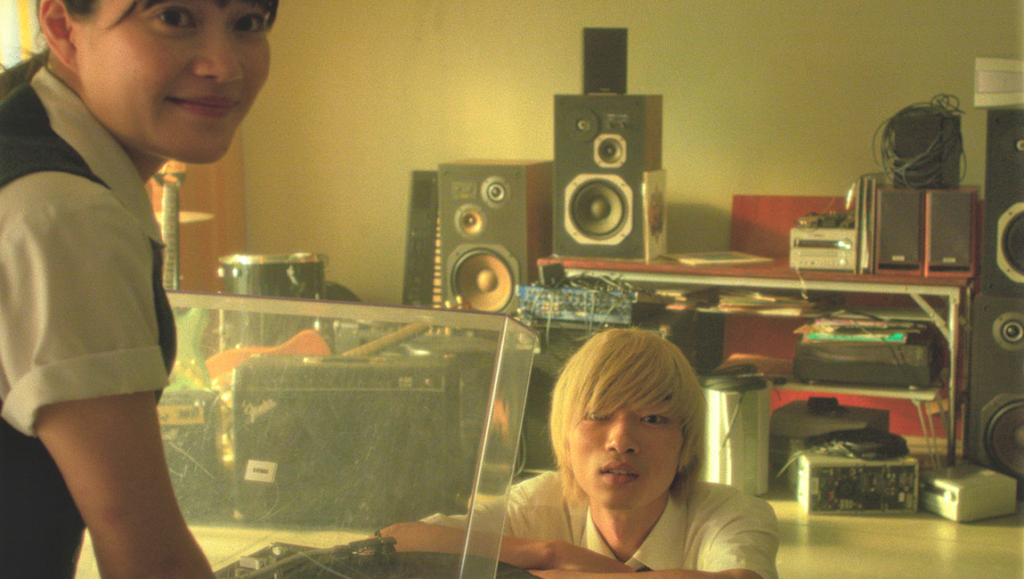Girl meets boy. Boy meets girl. Love blossoms. Reality sets in. The pandemic hits. They grow apart while remaining tethered to each other in explicable, inescapable ways — in light of the horrifying things we have seen in the world every day, mediated through information channels whose primary concern is keeping audiences complacent or redirecting their anger at undeserving targets, these past couple of years — including the very pandemic this film thematizes — it can be tempting to dismiss this kind of precious, small-scale romantic dramedy as irrelevant. (Indeed, a recent screening of Federico Fellini’s 1965 fantasy drama Juliet of the Spirits left me with the same question, given how far removed its solipsistic fantasizing seemed from its political context, on a surface level at least.)
At first glance, Plastic, directed by Daisuke Miyazaki, doesn’t seem concerned with the present at all. This is a story of two lovebirds who, in a lot of ways, refuse to live in the time they’re born into: he (Takuma Fujie) holds out hope for the kind of rockstar existence that is generally assumed to have died — if not after grunge, then surely in the streaming era — while she (An Ogawa) is, if less stubborn in her commitment, certainly enamored with the past and the remnants that still linger in her present. Their shared nostalgia for a time they never knew is exemplified by their love of Exne Kedy, a ’70s act that the characters refer to as “glam” but, as indicated by the songs that make up the soundtrack, is more of a Cheap Trick-esque power pop combo.
It’s this overlapping sensibility that draws them to each other in the first place. In 2018, she first notices him busking on the street of their small town, playing and singing along to the very same Exne Kedy tune she’s listening to on her headphones. She runs into him later and strikes up a conversation, which leads to them spending more and more time together, before eventually sharing a first kiss which abruptly teleports the narrative to 2019 where their innocent teenage romance has been worn down by the strains of the world around them. A memorable shot of empty auditorium seats, which ever-so-faintly evokes Tsai Ming-liang, obliterates any doubt that their relationship has taken a turn for the worse. But as they drift apart and build separate post-high school lives for themselves, life keeps placing them in each other’s orbit.
Much like it characters, the film itself, on a structural and formal level, feels out of time; or rather, like something transplanted into the present from decades past, barely reskinned, barely updated. Having cokes in diners, dress-up montages that double as tributes to acts like the Stooges and David Bowie, a first kiss at a provincial movie theater (that, wouldn’t you know it, happens to be playing Miyazaki’s 2019 film Videophobia, a charmingly anachronistic touch) — if it wasn’t for the occasional Zoom convo, talk of scanning QR codes, or on-screen text exchanges, facilitated through an app called “Line,” Plastic could pass for a 2000s indie romance. Two lovers who don’t fit in find each other before life inevitably forces itself between them.
These are easy connections to make, especially as a means of light mockery, but what makes Miyazaki’s coming-of-age story so infectious is its proximity to Peter Chan’s Comrades, Almost a Love Story. Miyazaki overlays his modest, simple story of young love with a remarkable grandness by gesturing at not only the grander socio-political circumstances that shape human relationships — aside from the pandemic itself, the film also gets at the difficulties of art-making in a world shaped by tech companies, the loss of venues and record stores as hangout spots — but also some good, if maybe a little quaint, fate.
There are numerous near-misses and multiple chance encounters punctuating the film’s runtime, but in Miyazaki’s hands, these don’t feel contrived, cruel, or in any way “cosmic,” but rather as true to life. (Contrast Plastic’s twists of fate with Comrades’ train ride to Hong Kong, for instance.) But, and this is perhaps most crucial, those moments ultimately serve to add meaning to the inevitable-feeling reunion the film hints at but doesn’t quite follow through on: the fickle nature of human connection, the things and people left behind as you become your own person, and the endless possibilities that keep opening up even as the world seems determined to snatch them all away.
DIRECTOR: Daisuke Miyazaki; CAST: An Ogawa, Takuma Fujie, Kyôko Koizumi; DISTRIBUTOR: Kani Releasing; IN THEATERS/STREAMING: October 4; RUNTIME: 1 hr. 44 min.


Comments are closed.